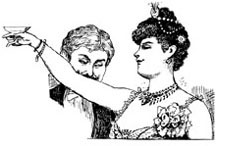
Power, Money, Deals, Drugs & Bimbos
HOLLYWOOD ACCORDING TO THOSE IN THE KNOW
Actors and actresses and comedians and comediennes have exerted enormous influence over this society via TV and cinema. What kind of people are they who are exerting that influence? A little reading in the popular press suggests that they are the unstable denizens of an unhappy town, a Hollywood where drug use, trading sexual favors, and mental illness are common.
Various entertainment writers have drawn attention to the widespread use of illegal drugs in Hollywood. For example:
(1) Roger Ebert: “Half the people in Hollywood seem to have gone through recovery from drugs and alcohol by now [1990].”1
(2) Jorge Casuso: “During the freewheeling ’70s, Hollywood seemed to be riding a coke-induced high. On screen, recreational drugs were the props of the glamorous…[or] they were psychedelic aids in the search for Truth…. Off-screen, drugs were part of the Hollywood mystique, seemingly taken as casually as a cocktail. Business deals were cut over vials of cocaine.”2
(3) Michael Kilian: “Hollywood was notorious [this said in 1984] for its nonchalantly open use of the drug [cocaine] by celebrities.”3
(4) Clarence Petersen wrote in 1992: Hollywood is “a mean town, run by weird men (mostly) addicted to power, money, deals, drugs, and bimbos.”4
(5) Walter Scott: “A knowledgeable studio executive tells Parade [magazine in 1996] that drug use is as big — or bigger — than ever in the movie capital [Hollywood].”5
(6) Hilary de Vries, in 1998, noted “Hollywood’s renewed use of drugs.”6
(7) And film critic Michael Wilmington, in 1998, similarly observed that “a sort of heroin/cocaine chic exists in today’s Hollywood.”7
You May Also Enjoy
J.D. Vance invoked St. Augustine and the 'ordo amoris' while discussing immigration issues, drawing great commentary from all sides and even a papal rebuke.
NPR’s programming has drifted downward and to the Left: the expectable, inevitable, massive movement of most institutions in a democracy.
A kernel of nihilism undoes whatever meaning modern men try to inject into their own lives.

